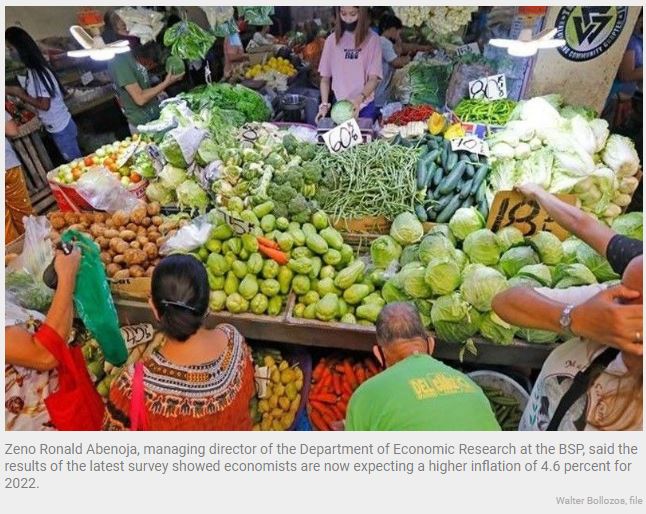Philippines: Economists hike inflation forecasts over next 3 years
MANILA, Philippines — Economists raised their inflation forecasts for the next three years due to the impact of the ongoing Russia-Ukraine war on global oil and food prices, according to a survey conducted by the Bangko Sentral ng Pilipinas (BSP).
Zeno Ronald Abenoja, managing director of the Department of Economic Research at the BSP, said the results of the latest survey showed economists are now expecting a higher inflation of 4.6 percent for 2022.
“Analysts expect inflation to breach the upper end of the government’s target range in 2022, with risks to the inflation outlook tilted to the upside largely driven by the adverse impact of the ongoing Russia-Ukraine conflict on global oil and food prices, which are already at elevated levels,” Abenoja said.
This is above the central bank’s two to four percent target range.
Based on the probability distribution of the forecasts provided by 11 out of 16 respondents, there is a 12.8-percent probability that average inflation for 2022 will settle within the two to four percent range, while there is an 86.7-percent chance that inflation will exceed four percent.
For 2022, BDO Unibank has the highest inflation forecast with 5.69 percent, followed by Metropolitan Bank & Trust Co. with 5.4 percent, Rizal Commercial Banking Corp. with 5.1 percent, Korea Exchange Bank with 4.8 percent, Robinsons Bank and San Miguel’s Bank of Commerce both at 4.7 percent.
Likewise, the inflation forecasts of economists for the next two years were also higher, although within the BSP’s target.
The respondents of the survey conducted by the central bank from May 12 to 17 expect a higher inflation of 3.6 instead of 3.4 percent for 2023 and 3.4 instead of 3.3 percent for 2024.
“Meanwhile, inflation is expected to settle close to the upper end of the target in 2023 before decelerating in 2024,” Abenoja said.
According to Abenoja, the upside risks to inflation identified by economists include the supply chain disruptions stemming largely from the geopolitical tensions between Russia and Ukraine, exacerbated further by the reimposition of lockdown measures in China and weather disturbances, as well as the elevated pressures on the global prices of oil and food commodities brought about by the ongoing Russia-Ukraine conflict, which could result in the continued emergence of second-round effects such as higher energy prices, transport costs and wage hikes.
Other risks, Abenoja said, are the rising domestic demand owing to the further reopening of the economy and the weakening of the peso against the dollar due to threats of downgrade of the Philippine economy and possible withdrawal of investments.
Meanwhile, Abenoja said a few analysts identified the emergence of the new COVID variant and possible resurgence of COVID cases as the main downside risk to the inflation outlook.
The BSP also supports the continued implementation of government subsidies, including the fuel subsidy program and livestock development and competitiveness bill as well as other non-monetary government interventions, such as the lowering of import tariffs on pork and rice to mitigate inflationary pressures.
Based on the latest survey, Abenoja said most of the economists anticipated the central bank to begin its policy tightening in the second quarter and hike the reverse repurchase rate by a range of 25 to 150 basis points between 2022 and 2024.
The BSP started its interest rate liftoff last May 19, hiking interest rates by 25 basis points for the first time in more than three years or since November 2018 to curb rising inflationary pressures.
During the rate-setting meeting, the central bank also raised its inflation forecasts to 4.6 instead of 4.3 percent for 2022 and to 3.9 instead of 3.6 percent for 2023.
Source: https://www.philstar.com/business/2022/05/23/2182936/economists-hike-inflation-forecasts-over-next-3-years


 English
English




